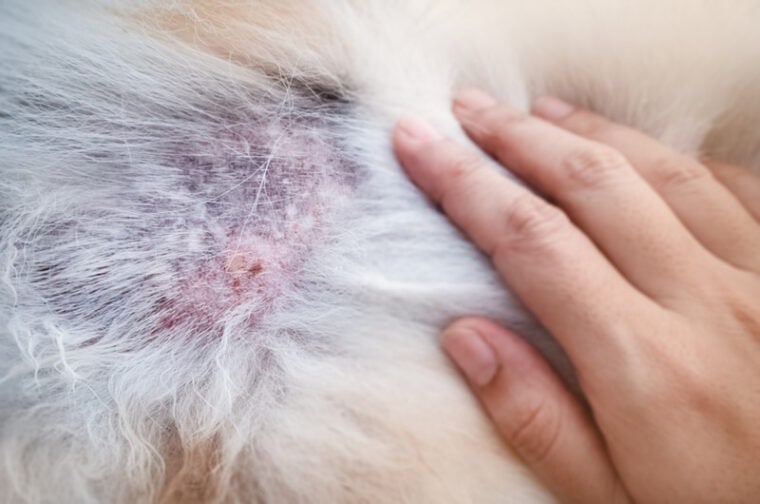
Folliculitis is the inflammation of the hair follicles and can occur due to allergies, bacterial infections, or other conditions. In some cases, the hair follicles can become infected, forming whitish or yellowish-white pimples.
This condition can be identified by the wounds that appear on the surface of the skin, swellings, or crusts of dead skin. To treat folliculitis, the veterinarian can prescribe a special type of shampoo, medicated spray, oral antibiotic, or antibacterial ointment to relieve itching and successfully treat the condition.
In this article, you will learn what folliculitis in dogs is, its clinical signs and causes, how it is diagnosed, and the treatment for this dermatological condition.
What Is Folliculitis in Dogs?
Folliculitis is a dermatological condition, meaning it is a skin disease. It is characterized by the inflammation of the hair follicles and is manifested by the occurrence of red spots and small swellings on the skin.
In some cases, these small bumps can become infected and form pustules (pimples) that have whitish-yellow ends. When the condition reaches this point, it is commonly discussed in veterinary medicine as bacterial folliculitis. In dogs, folliculitis is the most common kind of skin infection. This condition is often confused with acne.
Folliculitis occurs when the dog suffers from another, unidentified underlying illness, such as allergies, Cushing disease, or disorders of the immune system, or was subjected to skin trauma. In other words, if the primary condition is diagnosed and treated in time, folliculitis will not occur.
Dogs suffering from folliculitis will show several clinical signs, including excessive scratching, hyperpigmentation, and hair loss. Folliculitis is not a condition that can put your dog’s life in danger, but it cannot be treated at home, and a visit to the veterinarian is necessary.

What Are the Signs of Folliculitis in Dogs?
Folliculitis in dogs has specific clinical signs by which you can tell if your pet suffers from this skin condition. First, you will notice small red bumps (papules) on your dog’s skin, which are similar to acne. Over time, these papules can become infected and turn into pustules (vesicles filled with pus).
Due to folliculitis, your dog can experience intense itching, excessive scratching, pain in the affected area, and hair loss. Your pet’s skin color may also change, becoming darker. In some cases, the affected dogs may develop raw skin lesions called epidermal collarettes (circular scabs with darker skin, which are basically “footprints” of a pustular lesion).
What Are the Causes of Folliculitis in Dogs?
In most cases, folliculitis in dogs is a skin problem caused by a bacterial infection of the hair follicles. It is usually caused by a bacteria called Staphylococcus, but it can also be caused by other types of bacteria.
How Is Folliculitis Diagnosed in Dogs?
If you think that your dog has folliculitis or another skin condition, it is best to contact your vet. They will ask about your dog’s medical history and do a physical examination.
Folliculitis can be diagnosed after a physical examination.
To establish the cause, additional tests are needed, which could include:

How Is Folliculitis Treated in Dogs?
In order not to aggravate the already existing clinical signs of your dog, the veterinarian must establish the diagnosis and treatment.
The main condition that led to the development of folliculitis will be treated first. Therefore, in most cases, veterinarians can recommend systemic drugs combined with local treatments (shampoos, sprays, and/or ointments). Systemic medications, such as antibiotics, thyroid medication, etc. are prescribed if your dog’s folliculitis is caused by a systemic disease.
To prevent this condition, it is recommended to go to the veterinarian for periodic checkups (even if your dog seems healthy). It is also advisable to contact the vet as soon as your dog shows clinical signs of a skin condition and to use antiparasitic products regularly to prevent flea or tick infestations.
How Do I Care for a Dog With Folliculitis?
If your dog has been diagnosed with folliculitis, it is recommended to follow your vet’s instructions.
Frequently Asked Questions
How Long Does It Take for a Dog to Recover From Folliculitis?
Bacterial folliculitis will always need oral antibiotics to be treated. Dogs with bacterial folliculitis must take antibiotics for several weeks. It can take up to 6 weeks for a dog to recover from folliculitis. For certain primary conditions (which lead to folliculitis), such as hypothyroidism, your dog will need lifelong treatment.
Is Folliculitis Serious in Dogs?
Folliculitis is not a severe medical condition. It does not endanger your dog’s life, being one of the most common dermatological diseases in dogs. Therefore, do not panic if your dog is diagnosed with folliculitis because this skin condition can be treated with success. For this to happen, though, the vet must address the underlying condition that led to the development of folliculitis. In some cases, the underlying condition is a lifelong illness (e.g., hypothyroidism), and your dog will need treatment for the rest of their life.
Conclusion
Folliculitis is a common condition in dogs. It is not severe and can be treated successfully. It is a skin disease that causes inflammation of the hair follicles. The affected dog will develop reddish bumps on their skin, which can become infected (filled with pus), in which case, it is called bacterial folliculitis. Causes of folliculitis in dogs can include allergies, bacterial or fungal infections, viral infections, parasites, systemic diseases, other skin diseases, etc. It can be a bothersome condition due to the intense itching, but with proper diagnosis and treatment, most dogs make a full recovery.
If you suspect that your four-legged friend suffers from folliculitis, it is essential to consult a veterinarian as soon as possible.
Featured Image Credit: Love-Shutterstock








